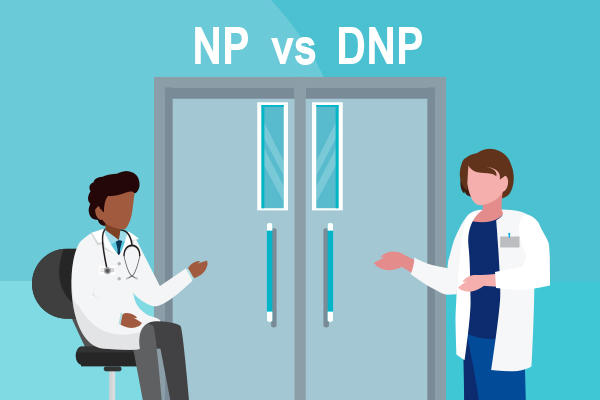Featured
Tags
Share
- Home / Blog / Nursing Today / RN to BSN: Public and Private Support
RN to BSN: Public and Private Support

If you are a registered nurse, you may be aware that the healthcare industry is pushing for, or even mandating, that many nursing positions be filled by baccalaureate-prepared nurses.
As members of America’s most trusted profession, nurses must continue to maintain high standards in education and practice. As nursing organizations set the bar for standards of practice, higher educational institutions are responding by developing RN to BSN programs.
In this article we’ll take a look at the job outlook for graduates of RN to BSN programs, why a BSN in nursing is important, the types of agencies and facilities that are in need of BSN-prepared nurses, and how Chamberlain University’s RN to BSN option can prepare nurses to fill available positions both within public healthcare institutions, but also federal and military agencies.
Opportunities Available When Advancing From an RN to BSN
It is true that many facilities, nursing associations, and accreditation bodies are recommending an increase in the number of nurses who possess a BSN degree. This shift is encouraging as you consider earning your RN to BSN.
A survey of nursing programs conducted by the American Association of Colleges of Nursing (AACN) in 2020 revealed that more than 80% of healthcare employers prefer to hire BSN-prepared nurses over registered nurses with associate’s degrees.
Magnet hospitals are recognized as leaders in nursing development and provide exemplary patient care. All Magnet Hospitals have mandated that all nurses in leadership or management positions hold a BSN degree, and are committed to increasing the number of BSN-prepared RNs employed in their facilities.
Advantages of Baccalaureate-Prepared Nurses
Associate degree and diploma nursing programs teach students the skills needed to pass the NCLEX and practice nursing in a clinical setting. A BSN degree can teach nurses higher level skills that may help them advance beyond a minimum level of clinical practice or compete for leadership positions, especially in a world of increasingly complex technical and clinical advances.
An AACN review of 30 years of research found that patients cared for by BSN-prepared nurses have shorter hospital stays, lower readmission and mortality rates, and better outcomes, as compared to patients cared for by nurses without a bachelor’s degree. AACN’s “The Impact of Education on Nursing Practice'' cites evidence that healthcare facilities, government agencies, nursing associations, and the public are vocal proponents of a BSN-heavy nursing workforce.
Other benefits of a BSN in nursing are opportunities for further education, a wider array of available nursing positions, and the potential for career advancement.
RN to BSN program option graduates have the educational background that allows them to pursue higher level education, such as a master’s or doctoral degree, and move beyond bedside nursing into management and leadership roles, positions on hospital boards, as researchers, and as CEOs of nursing agencies.
Where Are the Jobs for Nurses With a BSN Degree?
For-Profit Healthcare Institutions
Hospitals, private duty and home health nursing agencies, nursing homes, outpatient clinics, surgery centers, mental health practices, and private clinics are just some of facilities where the BSN-prepared nurse can carve out a meaningful career. There is no shortage of nursing positions, but there is an ongoing shortage of nurses. In fact, job openings for nurses in the U.S. are projected to approach 194,500 each year, on average, over the decade.
BSN opportunity exists not only in major medical systems, but in community clinics and rural hospitals as well. An aging population, the need to focus on primary prevention, and the rise of chronic conditions means the nation needs more nurses willing to care for the frail and elderly, and to practice in the communities where they live. The baccalaureate-trained nurse has the advanced skills to provide targeted care to a wide range of patient populations, resulting in better patient outcomes.
Public Sector Nursing Opportunities
A BSN degree can be the ticket to an exciting career in the public sector, including as a member of the U.S. Armed Forces or serving at the VA.
The largest federal employer of nurses, the Veterans Administration (VA), has a program that assists new nurses to transition successfully from student to independent registered nurse. The Registered Nurse Transition to Practice Residency provides preceptors and varied learning experiences during the new graduate’s first year of employment.
The military and the VA aren’t the only federal agencies that employ BSN-prepared nurses. The federal government has a need for nurses in agencies and facilities all across the country, including federal prisons, the Indian Health Service, and federal and state Health and Human Services agencies. Other federal agencies that employ nurses include the Department of Homeland Security, the Department of Transportation, the National Institutes of Health, and the Centers for Medicare and Medicaid Services.
Chamberlain’s Online RN to BSN Program Option Can Help
Chamberlain University’s College of Nursing BSN program is accredited by the Commission on Collegiate Nursing Education, making it a great choice for obtaining a baccalaureate in nursing degree, no matter where you want to work after graduation.
Chamberlain’s RN to BSN online program option can be completed in one year, but the program is flexible so that you can continue to work while studying for your bachelor’s degree. Contact us to find out how we can provide RN to BSN support so that you can take the next step in your career as a member of America’s most trusted profession.
By Chamberlain University
More from Nursing Today
Request More Information
To receive the Chamberlain University Program Guide, including associated career paths, please select a program of study.







